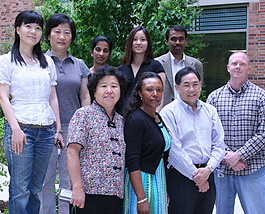
(From bottom left to right)
1st row: Yunhua Li, Gloria Shuler, Michael Quon, Chad Reiter;
2nd row: Ji-Won Lee, Hui Chen, Philomena Pullikotil, Cynthia Greenberg, Ranganath Muniyapppa.
Chief: Michael J. Quon, M.D., Ph.D.
Diabetes Unit
Contact Information
Diabetes Unit
Laboratory of Clinical Investigation
NCCAM/NIH
9 Memorial Drive
Building 9, Room 1N105, MSC 0920
Bethesda, MD 20892-0920
Phone: 301-496-6269
Fax: 301-402-1679
E-mail: quonm2@mail.nih.gov
Current Research
Research in the Diabetes Unit seeks to understand how nutritional supplements and functional foods modulate the biological actions of insulin and the molecular mechanisms of insulin resistance as they relate to the pathophysiology of diabetes, obesity, cardiovascular diseases, and their complications.
We employ a broad and comprehensive set of approaches that encompass molecular biology, cellular biology, whole animal physiology, mathematical modeling, and human physiology.
- Molecular and cellular studies focus on understanding signal transduction pathways controlling metabolic actions of insulin to promote glucose uptake through translocation of the insulin responsive transporter GLUT4, as well as characterizing the insulin signaling pathways in vascular endothelium related to the production of nitric oxide.
- Basic signal transduction studies are aimed at understanding the determinants of specificity in insulin action, including the elucidation and characterization of positive and negative feedback pathways, identification of novel substrates for kinase effectors of insulin signaling, and the investigation of localization and compartmentalization of signaling molecules in subcellular microdomains.
- Physiological studies in animals and humans explore the role of insulin, as well as nutritional supplements and functional foods, in regulating the interrelationship between metabolic and hemodynamic homeostasis.
- Mathematical modeling is used to develop novel tools for assessing insulin sensitivity and insulin secretion in humans for use in large epidemiological studies, as well as for following clinical changes after therapeutic interventions.
Current studies integrate previous work with newer areas involving nutritional supplements and functional foods. For example, laboratory studies are investigating molecular mechanisms of DHEA and EGCG (major component of green tea) to mimic and augment beneficial metabolic and vascular actions of insulin. In clinical studies we have developed novel techniques for evaluating metabolic and vascular function in human diabetes, obesity, and cardiovascular diseases. These tools are currently being used in active approved clinical protocols to evaluate effects of vitamin C, glucosamine, cocoa, and EGCG to alter insulin resistance and endothelial dysfunction in a variety of important diseases including diabetes, obesity, and hypertension. Future laboratory and clinical studies may include investigations of magnesium, green tea, alpha-lipoic acid, and other nutritional supplements, nutraceuticals, botanicals, and functional foods. Once interesting clinical phenomena are rigorously documented, laboratory investigations to elucidate molecular mechanisms will be implemented. Conversely, exciting findings in laboratory molecular studies will be translated into clinical investigations in human disease.


